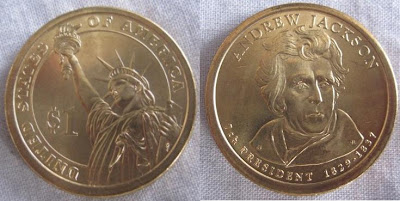USA presidential dollar #8: Martin Van Buren

Only about 5 feet, 6 inches tall, but trim and erect, Martin Van Buren dressed fastidiously. His impeccable appearance belied his amiability--and his humble background. Of Dutch descent, he was born in 1782, the son of a tavernkeeper and farmer, in Kinderhook, New York.
Martin Van Buren was elected Vice President on the Jacksonian ticket in 1832, and won the Presidency in 1836.
Van Buren devoted his Inaugural Address to a discourse upon the American experiment as an example to the rest of the world. The country was prosperous, but less than three months later the panic of 1837 punctured the prosperity.
Basically the trouble was the 19th-century cyclical economy of "boom and bust," which was following its regular pattern, but Jackson's financial measures contributed to the crash. His destruction of the Second Bank of the United States had removed restrictions upon the inflationary practices of some state banks; wild speculation in lands, based on easy bank credit, had swept the West. To end this speculation, Jackson in 1836 had issued a Specie Circular requiring that lands be purchased with hard money--gold or silver.
In 1837 the panic began. Hundreds of banks and businesses failed. Thousands lost their lands. For about five years the United States was wracked by the worst depression thus far in its history.
Programs applied decades later to alleviate economic crisis eluded both Van Buren and his opponents. Van Buren's remedy--continuing Jackson's deflationary policies--only deepened and prolonged the depression.
Declaring that the panic was due to recklessness in business and overexpansion of credit, Van Buren devoted himself to maintaining the solvency of the national Government. He opposed not only the creation of a new Bank of the United States but also the placing of Government funds in state banks. He fought for the establishment of an independent treasury system to handle Government transactions. As for Federal aid to internal improvements, he cut off expenditures so completely that the Government even sold the tools it had used on public works.
Inclined more and more to oppose the expansion of slavery, Van Buren blocked the annexation of Texas because it assuredly would add to slave territory--and it might bring war with Mexico.
Defeated by the Whigs in 1840 for reelection, he was an unsuccessful candidate for President on the Free Soil ticket in 1848. He died in 1862.
USA presidential dollar #7: Andrew Jackson

Andrew Jackson (1767-1845) was the seventh President of the United States, serving from 1829 to 1837. Sometimes nicknamed “Old Hickory,” Jackson was the first president not born an aristocrat. Andrew Jackson’s Scotch-Irish parents Andrew Jackson, Sr. and Elizabeth “Betty” Hutchinson immigrated to the US from Carrickfergus, in modern-day Northern Ireland, in 1765.
There is a dispute over his place of birth. While he claimed to have been born in South Carolina, he might have done so for political purposes. The two most likely places were Waxhaw, North Carolina or Lancaster, South Carolina which are very close. The line between the states was not yet drawn at the time of his birth.
During the Revolutionary War Jackson and his brother Robert joined the Continental Army as couriers. At one point they were taken prisoner; when they refused to shine the boots of one of their captors, the officer lashed out with his saber, wounding Jackson on the hand and forehead. Along with the scars from the incident, he carried a hatred of the British for the rest of his life. The boys caught smallpox during this period and, although Jackson survived, Robert succumbed to the disease. These hard experiences explain Jackson’s tough, sometimes violent character. When insulted, he was not opposed to resolving the matter with pistols.
Jackson remained in the army and prospered. He became a national hero after defeating the British in the 1815 Battle of New Orleans. Afterwards, he fought the Creek Wars and the Seminole War, invading Florida and becoming its military governor in 1819 after it was ceded to the United States by Spain in the Adams-Onis Treaty.
In the Presidential Election of 1824 Jackson won both more popular and electoral votes than any other candidate, but did not receive an overall majority. The election went to the House of Representatives, where John Quincy Adams was chosen as President.
Jackson felt that the 1824 election had been stolen from him and the will of the people ignored. Jackson and his supporters were furious and immediately started campaigning for the next election in 1828. Jackson beat Adams with a substantial majority, and took office as President in 1829.



No comments:
Post a Comment